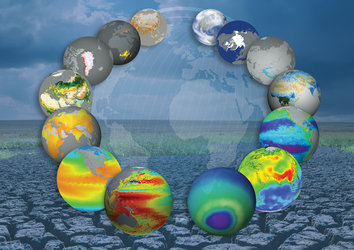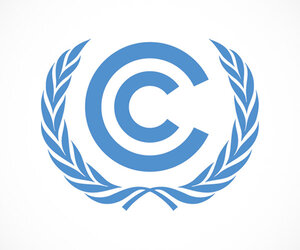ESA attending UN Climate Conference
Representatives from 194 countries have gathered at the 2010 UN Climate Change Conference in Cancun, Mexico, to continue working towards tackling climate change.
ESA is attending 'COP16' to update negotiators on satellite observations of climate, and to explain how the ESA Climate Change Initiative will provide consistent data to help scientists better understand climate change.
Our climate is a complex system made up of many different parts, all interacting together. No one part can be understood in isolation. Instead, measurements of all individual climate variables need to be combined.
By using these new datasets to feed climate models, scientists can simulate the past, understand the present and improve their models to better predict the climate of the future.
The Climate Change Initiative will combine data from satellites going back three decades with observations from new missions to produce consistent, long-term records for a wide range of essential climate variables such as sea level rise, ice extent and thickness, sea-surface temperature, and vegetation cover. Climate research and modelling communities worldwide will have free access to these data.
The information is required by the Global Climate Observing System (GCOS) to support the UN Framework Convention on Climate Change (UNFCCC) and the scientific work of the Intergovernmental Panel on Climate Change.
ESA will maintain an exhibit throughout COP16 (the 16th Conference of the Parties) and host a special side event on the Climate Change Initiative on 2 December, where top climate scientists will show examples of essential climate variables – such as sea level trends and forest fires) explaining how they are used to develop and validate climate models. The coordinated efforts of space agencies worldwide to provide climate data will also be outlined.
The event will highlight the contribution of ESA’s Living Planet Programme, including two decades of observations from ERS and Enivsat, the recent Earth Explorer scientific missions and the Global Monitoring for Environment and Security (GMES) operational programme, which will maintain a constellation of satellites continuously monitoring 24 of the 44 essential climate variables for the next three decades.
Discussions at COP16, 29 November – 10 December, are focusing on how countries should reduce their carbon emissions to ensure that global temperature rise does not exceed 2ºC.
Another hot topic under the spotlight is the Reducing Emissions from Deforestation and Degradation (REDD+) scheme, which uses satellite observations of forests, that involves developed and developing countries working together for carbon offsetting.















 Germany
Germany
 Austria
Austria
 Belgium
Belgium
 Denmark
Denmark
 Spain
Spain
 Estonia
Estonia
 Finland
Finland
 France
France
 Greece
Greece
 Hungary
Hungary
 Ireland
Ireland
 Italy
Italy
 Luxembourg
Luxembourg
 Norway
Norway
 The Netherlands
The Netherlands
 Poland
Poland
 Portugal
Portugal
 Czechia
Czechia
 Romania
Romania
 United Kingdom
United Kingdom
 Slovenia
Slovenia
 Sweden
Sweden
 Switzerland
Switzerland




























